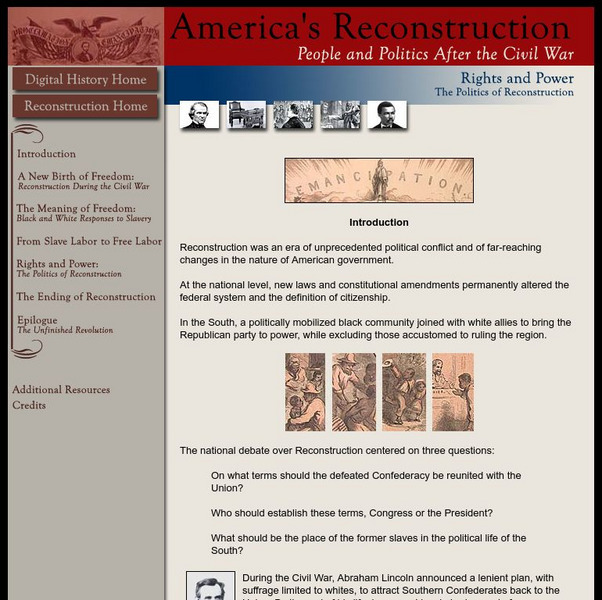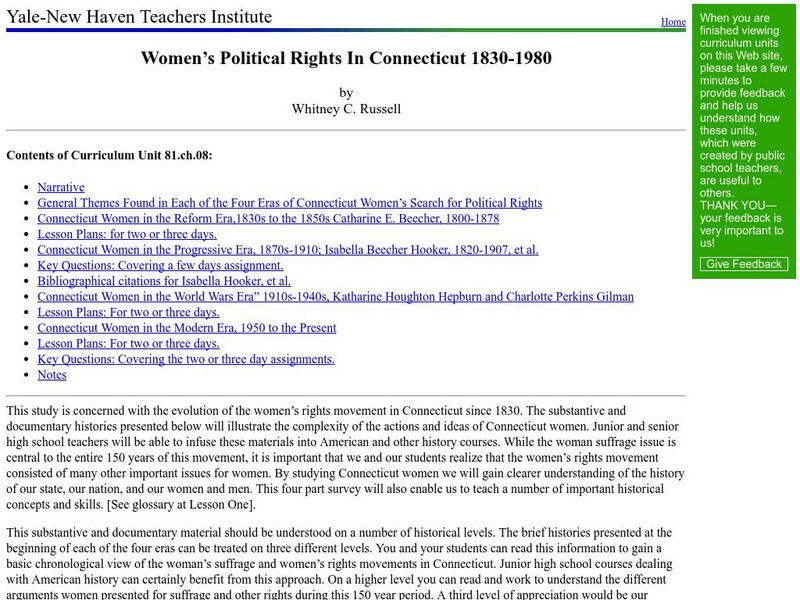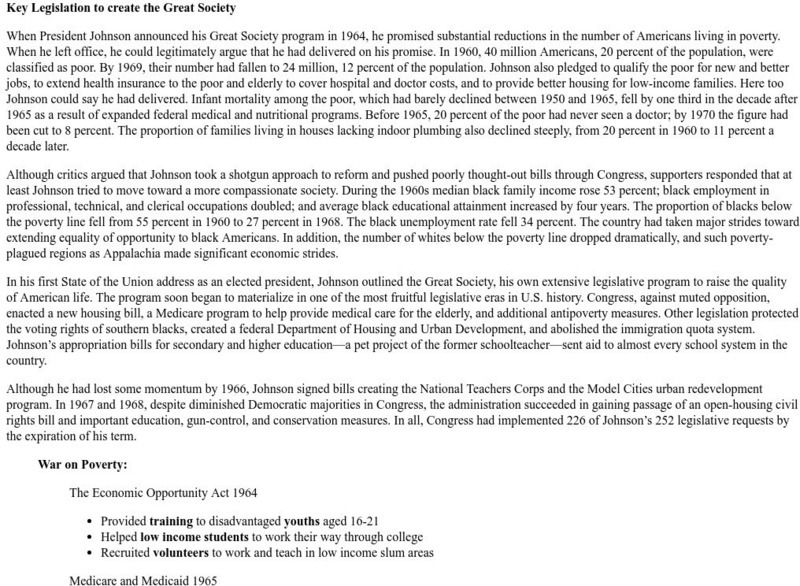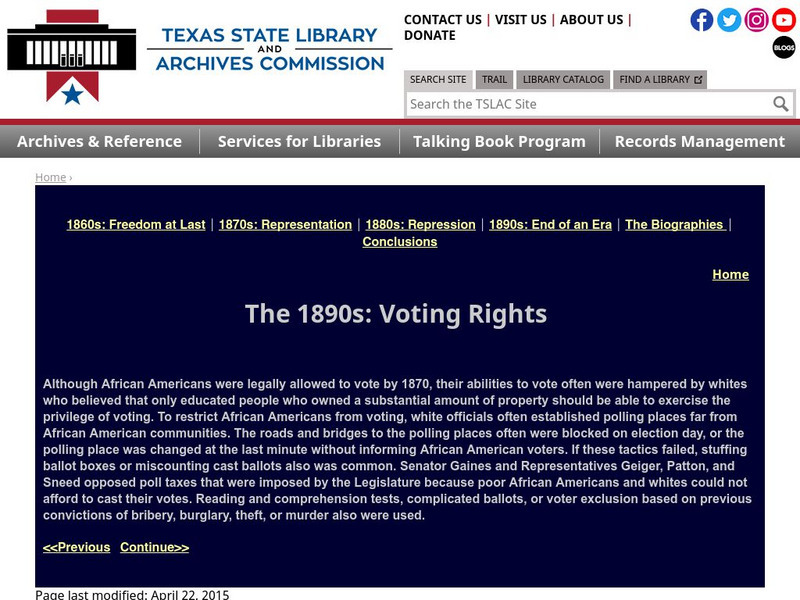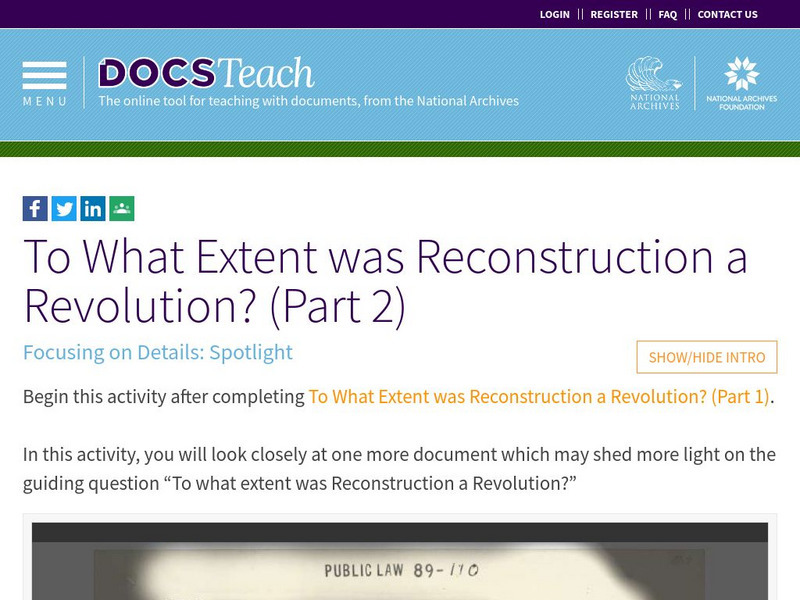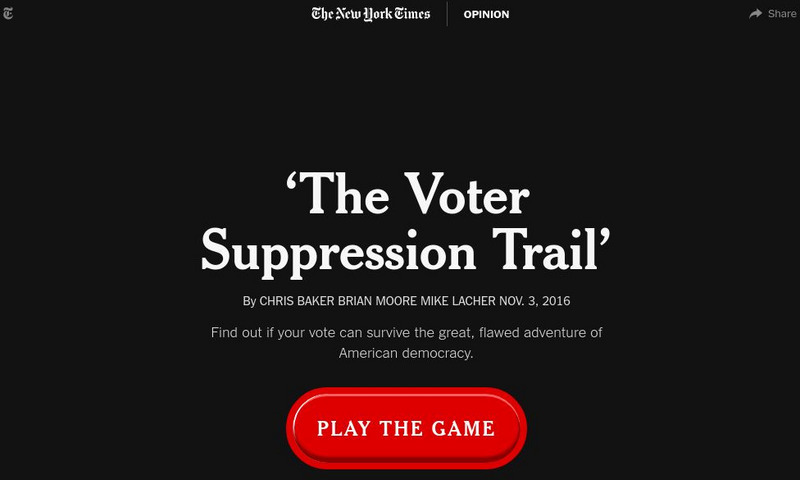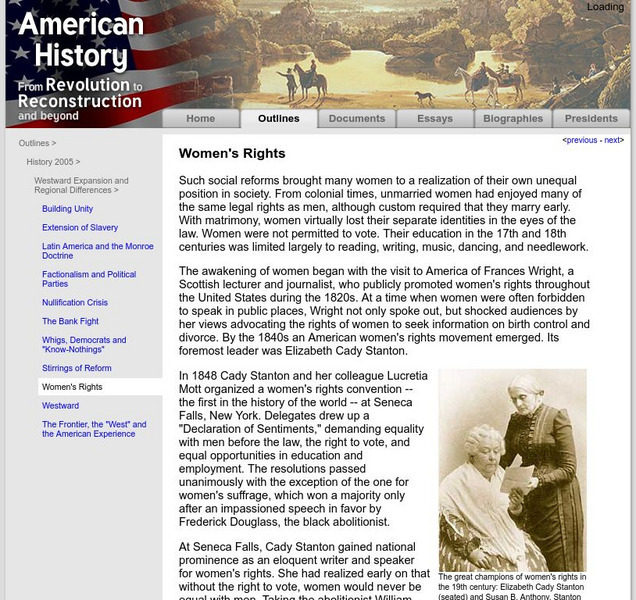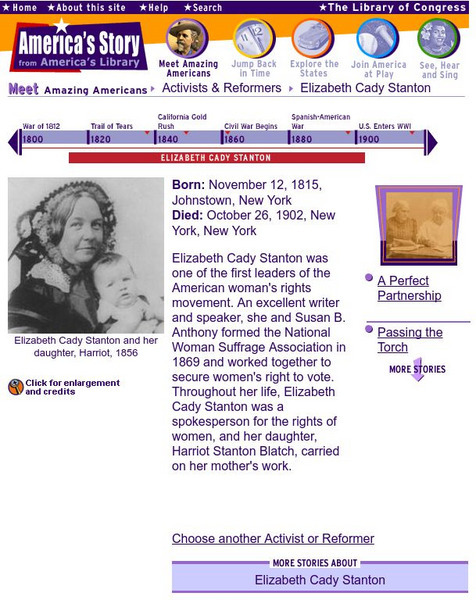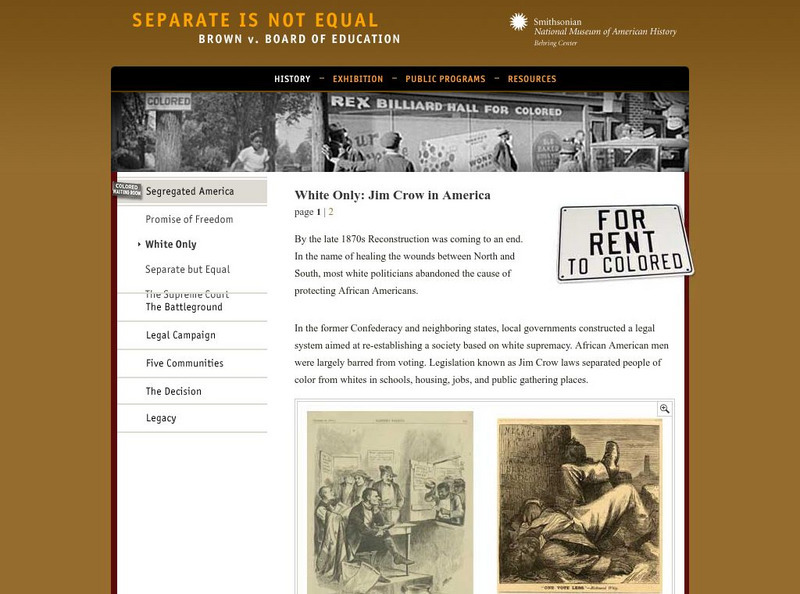Digital History
Digital History: America's Reconstruction: Rights and Power
This resource provides information about Reconstruction, the United States Government, slavery, and civil rights.
Yale University
Yale New Haven Teachers Inst.: Women's Political Rights in Connecticut 1830 1980
Teachers and students alike can check out this site to learn about the women's suffrage movement in Connecticut. The brief history is followed by lesson plan suggestions.
US National Archives
Nara: Treasures of Congress: Progressive Reform Votes for Women
Check out this wonderful interactive site from the National Archives and Records Administration, to learn about the women's suffrage movement during the Progressive Era. See photos and primary documents related to the topic (click to...
Khan Academy
Khan Academy: Ap Us History Unit: Period 7: 1890 1945: The Nineteenth Amendment
The study resource from Khan Academy provides an overview of Period 7: 1890-1945 in American History. The Nineteenth Amendment is discussed in this lesson. This resource is designed as a review for the AP US History Test.
Other
Weber State: Key Legislation to Create the Great Society
Read about President Lyndon Johnson's vision for a more compassionate America, one that offered educational and housing opportunities, protected the envrionment, and cared for the nation's seniors. Find a list of the legislation passed...
PBS
Pbs Learning Media: Martin Luther King Jr.: Civil Rights Leader
Students will explore how King's deep-seated commitment to nonviolence contributed to the expansion of social justice in the United States, particularly for African Americans.
Texas State Library and Archives Commission
Texas State Library and Archives Commission: The 1890s: Voting Rights
Though given the right to vote by 1870, African-American men faced several problems when it came to voting. This is a brief description of what they faced.
US National Archives
Docsteach: To What Extent Was Reconstruction a Revolution? (Part 2)
This activity is a continuation of the instructional activity for Part 1. In it, students will examine the Voting Rights Act of 1965 and determine whether their analysis of this document changes their responses to the guiding question in...
Other
The Center for Voting & Democracy: Gerrymandering
This site provides a brief description of the term gerrymandering and where the term originated.
Digital History
Digital History: Affirmative Action and the Case of Allan Bakke [Pdf]
The history of affirmative action was interwoven with the Civil Rights Act of 1964 and the Voting Rights Act of 1965. Read about how the federal government under both President Kennedy and President Nixon attempted to open up jobs to...
Social Studies Help Center
Social Studies Help Center:how Did the Warren Court Protect the Citizens' Rights
The Warren Court was a busy one. Read about the famous decisions made by that court in just a few years.
Other
Celebrating Rights and Responsibilities: Story of the 15th Amendment in Maryland
This resource houses an essay on the passing of the 15th Amendment in Maryland. The essay discusses the political motivations behind the passing and how this affected the black population of the state.
Library of Congress
Loc: Teachers: Suffrage Strategies: Voices for Votes Lesson Plan
Students will learn all about the history of suffrage for women and what influences were used to change people's attitudes. They will then use their understanding to create a modern-day election document of ephemera, for example, a...
New York Times
New York Times: The Voter Suppression Trail
[Free Registration/Login Required] Great learning "game" to help people understand the difficulties many people face when they want to vote in the United States. Based on the infamous Oregon Trail video game, see if your selected person...
Curated OER
Cbc: New Rules to Allow Homeless to Vote
Prior to 2000, voters needed to have a home address to vote but Elections Canada lifted this criteria and thereby granting an approximate 200,000 more people to the voter's list.
University of Groningen
American History: Outlines: Women's Rights
Such social reforms brought many women to a realization of their own unequal position in society. From colonial times, unmarried women had enjoyed many of the same legal rights as men, although custom required that they marry early. With...
Library of Congress
Loc: America's Story: Elizabeth Cady Stanton
America's Story tracks the woman's rights movement through the eyes of one of the leaders of the movement. Elizabeth Cady Stanton worked side by side with Susan B. Anthony to secure voting rights for women.
National Women’s History Museum
National Women's History Museum: Political Culture and Imagery of Woman Suffrage
An overview of the woman's suffrage movement in America (1840-1920), with an emphasis on the banners, ribbons, pamphlets, posters and other kinds of visuals produced by proponents of voting rights.
Siteseen
Siteseen: American Historama: Selma March
The Selma Freedom March from Selma to Montgomery, Alabama took place in March 1965 as part of the voting rights movement.
National Women’s History Museum
National Women's History Museum: 19th Amendment
Examine the ratification of the Nineteenth Amendment to the U.S. Constitution granting women voting rights.
PBS
Pbs Learning Media: Concerned White Citizens of Alabama Scrapbook
These materials document the philosophy and activities of the Concerned White Citizens of Alabama, who fought for racial equality and voting rights for African Americans; from the Birmingham Civil Rights Institute.
Smithsonian Institution
National Museum of American History: Separate Is Not Equal: White Only
This section from the Smithsonian Institution's National Museum of American History's exhibition Separate Is Not Equal: Brown v. Board of Education gives the history of Jim Crow laws and how they affected not only the voting rights of...
Gilder Lehrman Institute of American History
Gilder Lehrman Institute: History Now: Securing the Right to Vote: Selma to Montgomery Story
[Free Registration/Login Required] Lesson plan asking this essential question: "What conditions created a need for a protest march from Selma to Montgomery in 1965 and what did that march achieve?"
Utah Education Network
Uen: Civics: Elections
Citizens of democratic countries consider voting one of their chief rights because it allows them to choose who will govern them. Learn about voting rights and the election process.
Other popular searches
- Voting Rights Movement
- Voting Rights Act
- 1965 Voting Rights
- Minority Rights and Voting
- America and Voting Rights
- America Voting Rights
- Voting Rights Act 1965
- Voting Rights History
- Voting Rights Act of 1965
- Expanding Voting Rights
- Voting Rights of Women
- History of Voting Rights


